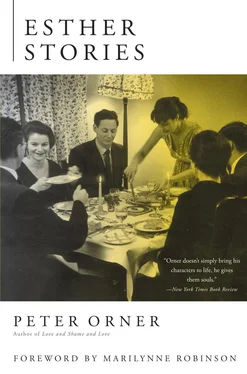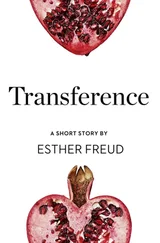“Tell him I’m teaching. Tell him my purse is on the bench in the backroom.”
Tuesday morning, and the tweed coat doesn’t fit and smells of Pall Malls. Philip Burman looks like a kid playing dress-up. The coat is left over from his high-school days, and it didn’t fit well even then. A hand-me-down from his Uncle Wallace. Wallace was ten years younger than Seymour, closer in age to his nephew than to his brother. The story goes that he laughed a lot — out loud — deep belly laughs that made the rest of the family nervous. The other legend is that it wasn’t just a heart attack that dropped Wallace dead at thirty-eight, but also the stormy intensity of my grandfather to excel, to expand, to go public. Wallace was famous for failing. He didn’t pay attention to unpaid balances. He neglected details, forgot appointments, always ran late. He sired only daughters.
On the El, Philip tugs his sleeves in an attempt to stretch the coat’s arms. The knot under his chin is excruciatingly tight, but he knows if he loosens his tie his father will notice right away. Today he will suffer it. The other people on the subway stare straight ahead or out the window at the tar-paper roofs of stores and the back porches of rambling tenements. Their bundled shoulders jolt with every lurch of the train.
At the office Philip examines claims. He makes check marks. His job is to search for inconsistencies. In the numbers, in the descriptions of the accidents, in the words of his father, which liar did what to the other liar? He shuffles his feet under his table. The office is cold, and he bounces his legs to keep his feet warm. The place is so silent that the flap of the turning of papers gets on his nerves. Washing out the fat drawer at Goldy’s beat this. Fred and Myron yammering about the price of hog whatevers and beans.
The one bright spot is his father’s secretary. Her name is Shirl. Not Shirley. She’s already corrected him twice. “Only my mother calls me Shirley and she lives in Toledo.” She’s got on a thin print dress that is too short and summery for the weather. She’s got plump cheeks and sighs a lot.
Behind Shirl, beyond the closed office door, Seymour sits at his desk, a paperweight gripped in his hand. Just before lunch he often daydreams about the war. Today, in a starchy uniform and creased leather-brimmed hat, he struts the bridge. The captain. Of all the guys on the ship, there’s only one guy who’s captain. He thinks about shaking Jackie Cooper’s hand at Nouméa, New Caledonia. How many men can say they held Jackie Cooper’s sweaty palm in theirs?
Seymour’s lackey, a very tall, timid, small-eyed man named Roger Craigson, has the office to the right of his boss. Craigson’s door is open. It’s Craigson who gives Philip work. He approaches Philip’s little table, blinking profusely, forcing a smile.
“Howz it?”
“I guess all right. I found some inconsistent things.”
“Excellent. Let’s have a look at your effort.” Much is not said. Craigson is wary of the boss’s kid. Craigson had a wife once, but she ran, and now he wears this humiliation in the smile that juts out both edges of his mouth like twin scars. He’s prepared for any kind of insult — he’s endured them all — and he looks at Philip and waits for him to say something snide. But Philip says nothing, just points to what he’s found and waits for Craigson to leave so he can stare more at Shirl’s breasts, which project from her chest like the prows of attacking ships. She types like a banshee. The letters whack the paper as if she’s punching a bag.
Seymour’s door bangs open. “I’ll be at the Berghoff,” he says. Shirl nods and looks curiously at Philip, who — she’d noticed — looked down immediately at the sight of his father.
“I just wanted to talk to you,” Philip says. “Outside the office.” The bartender clinks glasses, hums a silent song to himself. He’s shrivel-faced and small, so tiny only his head bobs above the bar, like a begging child. He looks at my father and sucks his cheeks. The place is called the Charlie Boo’s: nothing more than a cramped narrow room, hardly more than the bar itself, some stools and green and brown bottles in front of a mirror. A jukebox is jammed against the far wall. There’s one guy at the end who looks as if he’s counting his fingers, over and over.
It is Thursday evening, four blocks from the office. Philip has followed Shirl.
“Look. I don’t want to be harsh, but you’re a kid. Not only are you a kid, but you’re the honcho’s kid.”
“I just wanted to talk to you. Without Craigson’s eyes.”
Shirl sighs and glances at herself in the mirror, nudges her hair. “Don’t think about him. He’s a dopey. Worry about the honcho.” She looks at the door. “Look, anyway, I’m waiting for somebody.”
Philip, his hands in his lap, rubs his thumbs together. “I’ll wait with you until your friend comes,” he says.
“Uy yuy yuy,” she says, warming to him. She orders two beers from the little bartender.
The bartender looks doubtfully at Philip and winks at Shirl.
“The kid trailed me.”
“You want me to take him by the ear?”
“I’m twenty-five,” Philip says, and puts a ten-dollar bill on the table.
“I’m Adlai Stevenson,” the bartender says, and places two glasses before them.
“Thank you, Boo Bear,” Shirl says. She has a slight double chin, a second layer of skin softly rounds and dips below her jaw. She turns to Philip. “So you flunked out of school and now you’re working for Daddy.”
“Not for long.”
“What are you going to do?”
“I don’t know. Something else.”
“Does the big guy know?”
“Screw him,” Philip says. “It doesn’t matter. I’m getting my own place. And a different job. So—” Shirl laughs and leans into the bar, tips over a glass with her elbow. A foamy stream nearly flows over the bar, but Philip blocks it with his sleeve before it has a chance to drop and spill all over her dress.
Shirl rattles the bar. Says, “What about a little whiskey for the babe in the woods?”
She lives on the third floor of a walk-up on North Pratt. They get off the El and walk along streets lined with dirty plowed snow that looks like piled ash. Now bundled in Wallace’s beer-stained coat, Shirl marches ahead. Philip follows in shirtsleeves, quietly shivering, fearful of saying the wrong thing and being sent home. It is after midnight and they’ve been drinking for hours. Across the street from Shirl’s building is a construction site, a large pit ringed by earth-moving machines that look to Philip like giant sleeping dinosaurs. Shirl flings open the lobby door. He watches her bare red ankles as she tromps up the stairs.
Shirl unlocks her door and leads him into a black hall. She turns on the light. “This is where I live,” she says. He blinks, and through the purple light in his eyes he sees a green couch and a metal card table. She flicks the light off. “You saw it. There it was.” She leads him, clackety-clacking, through a dark room to a bed twice the size of the one in his own room. She pushes him onto to it, kisses him, then rolls over and pulls her dress over her head. He places his hands on Shirl’s coarse bra and shuts his eyes. The bed twirls. Shirl unbuttons his shirt, kisses him again, and bites his lip with a pointy incisor. He grabs her shoulders and squeezes. His feet begin to thaw.
“I have a cat,” she says.
Philip murmurs that he hates cats.
“You won’t hate Theresa. Nobody hates Theresa.” Her movements are quicker now, more abrupt, as though she wants to settle whatever this night’s going to turn into before she is too exhausted to move anymore. She yanks his shoes off and throws them across the room. She unzips his pants, pulls the cuffs, and slides them off. Scrunches next to him. “Okay,” she says, and licks his ear. “Let’s get this circus under way.”
Читать дальше












